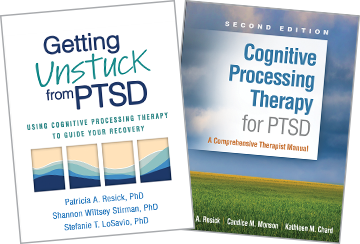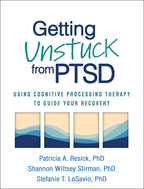Getting Unstuck from PTSD
Using Cognitive Processing Therapy to Guide Your Recovery
Patricia A. Resick, Shannon Wiltsey Stirman, and Stefanie T. LoSavio

Winner (Second Place)—American Journal of Nursing Book of the Year Award, Consumer Health Category
Mental health professionals, see also Cognitive Processing Therapy for PTSD, Second Edition, by Patricia A. Resick, Candice M. Monson, and Kathleen M. Chard, the authoritative CPT treatment manual for clinicians.
“For patients with PTSD who are willing to do the hard work of recovery on their own, and especially those who can’t afford individual therapy, this book offers real help. The exercises are clear and easy to understand, if emotionally difficult. The authors remain encouraging throughout, as if to say to readers, ‘You can do this.’”
—American Journal of Nursing
“An outstanding self-help re-imagining of the Cognitive Processing Therapy (CPT) model, intended to be used by individuals seeking help for PTSD. This self-guided CPT workbook is suffused with rich and plentiful examples inspired by the authors’ expert experiences with hundreds of survivors of traumatic experiences….The authors do a phenomenal job converting a jam-packed intervention into an accessible format for readers without leaving out any components from the original treatment. This resource also fills a critical gap in treatment access by increasing opportunities for individuals around the globe to access CPT, especially in situations where seeing a therapist weekly is not possible due to financial or other logistical constraints…. [This book] may also serve as valuable supplemental reading for trainees and even seasoned clinicians because it is written in such an easily understandable manner and includes so many useful, client-facing vignettes, worksheet explanations, and possible questions to ask. Given the need for additional resources for individuals who may not have access to a therapist, the authors are commended for undertaking the creation of this much-needed, comprehensive, yet accessible workbook for those seeking help for PTSD.”
—Journal of Contemporary Psychotherapy
“This book is a self-help book but can also be used along with a therapist to help guide individuals through their PTSD utilizing cognitive processing therapy….This is one of the most easy-to-read and easy-to-use self-help guides for PTSD in a long time. It is reader friendly, the material is digestible, and the worksheets are enjoyable to use. Highly recommended! *****”
—Doody's Review Service
“This wonderful book is an important resource for individuals who have experienced trauma, who can work through the workbook alone or with a therapist. This evidence-based treatment becomes readily accessible to the reader, with its clear outline, concrete steps, and examples. It will bring hope to those who suffer from PTSD, helping them change their beliefs and coping strategies, so they can live the life they want.”
—Judith S. Beck, PhD, President, Beck Institute for Cognitive Behavior Therapy
“The book is gentle and reassuring—the authors provide encouragement at every step. At first I was nervous about doing the exercises, but after an hour I could barely write fast enough! One very valuable part of this book is how it helps you distinguish between facts, thoughts, and feelings, and exactly how to deal with each of them. Highly recommended.”
—Linda H., Saskatoon, Canada
“This is the PTSD self-help book I’ve been waiting for. Not everyone is able to see a therapist. The strategies in this book are informed by extensive research and are written in a way that makes them easy to understand and use.”
—Debra Kaysen, PhD, ABPP, Department of Psychiatry and Behavioral Sciences, Stanford University
“If you want to take back your life from PTSD, this book is a gift. The authors are psychologists with many years of clinical experience among them, who write with warmth and compassion.”
—Tara E. Galovski, PhD, Director, Women’s Health Sciences Division, National Center for PTSD; Department of Psychiatry, Boston UniversityChobanian and Avedisian School of Medicine
“I love this workbook—it’s super solid. Besides the information being sound and smart, the way it is presented is perfect. The worksheets and exercises helped make complex, overwhelming emotional issues feel more approachable, so I could understand and work through them.”
—Mary C., Chicago
“CPT is a truly groundbreaking treatment. This practical, informed, and compassionate workbook teaches you to identify and change the stuck points that trap you in the past, so you can cope better and overcome guilt, fear, and helplessness. This is a book that every trauma survivor should have. It not only will make lives better, but in some cases will save lives.”
—Robert L. Leahy, PhD, author of If Only…
“Decades of research have shown that CPT is a highly effective treatment. This easy-to-read self-help guide puts the tools for recovery directly into your hands. It is filled with relatable scenarios, tried-and-tested techniques, and helpful solutions.”
—Reginald D. V. Nixon, PhD, College of Education, Psychology, and Social Work, and Flinders University Institute for Mental Health and Wellbeing, Flinders University, Australia
“CPT enables trauma survivors not only to recover from PTSD, but also to enjoy increased resilience in the face of future stressors and life challenges. Now the developer of CPT, together with her master clinician colleagues, shares this remarkable approach to PTSD recovery directly with readers who may lack access to a formally trained CPT therapist. Invaluable!”
—Ann M. Rasmusson, MD, Department of Psychiatry, Boston University Chobanian and Avedisian School of Medicine
Table of Contents
I. Introduction: How People Get Stuck in PTSD and How to Get Unstuck2. How PTSD Keeps You Stuck
3. Making a Plan to Get Unstuck from PTSD
II. Identifying Where You Are Stuck
4. Introduction to PTSD and Trauma Recovery
5. Processing the Meaning of Your Trauma and Building a Stuck Point Log
6. Identifying Thoughts and Feelings
III. Getting Unstuck from Beliefs about the Trauma
7. Beginning to Examine Your Worst Traumatic Event
8. The Exploring Questions Worksheet
9. Introducing Thinking Patterns
10. Using the Alternative Thoughts Worksheet to Balance Your Thinking
IV. Getting Unstuck from Trauma-Related Beliefs about the Present and Future
11. Safety
12. Trust
13. Power and Control
14. Esteem
15. Intimacy
V. Moving Forward
16. Finishing Cognitive Processing Therapy
17. Conclusion
Appendix
Resources
Index
About the Authors
Patricia A. Resick, PhD, ABPP, is Professor Emeritus of Psychiatry and Behavioral Sciences at Duke University School of Medicine. She developed cognitive processing therapy (CPT) in 1988 at the University of Missouri–St. Louis, where she founded the Center for Trauma Recovery and was an Endowed Professor. For a decade, she was Director of the Women’s Health Sciences Division of the National Center for PTSD. She has conducted numerous randomized controlled trials of CPT with civilians and active-duty military. Dr. Resick has served as president of the International Society for Traumatic Stress Studies (ISTSS) and the Association for Behavioral and Cognitive Therapies (ABCT). She is the recipient of numerous research and mentoring awards, including Lifetime Achievement Awards from Division 56 (Trauma Psychology) of the American Psychological Association, ISTSS, and ABCT.Shannon Wiltsey Stirman, PhD, is Professor in the Department of Psychiatry and Behavioral Sciences at Stanford University. She has been working with people with posttraumatic stress disorder (PTSD) and conducting research on PTSD since the early 2000s. Dr. Wiltsey Stirman provides training and consultation in cognitive processing therapy and cognitive-behavioral therapy and studies their effectiveness and their implementation in public mental health settings. She has a particular interest in developing digital mental health tools and other approaches to make effective treatment more widely available outside the context of traditional therapy.
Stefanie T. LoSavio, PhD, ABPP, is Assistant Professor in the Department of Psychiatry and Behavioral Sciences at the University of Texas Health Science Center at San Antonio and Director of Research and Innovation at the STRONG STAR Training Initiative. Dr. LoSavio specializes in evidence-based treatments for posttraumatic stress disorder (PTSD) and co-occurring conditions. She is a national cognitive processing therapy trainer and has provided consultation for numerous research trials and training initiatives. Her research focuses on the effectiveness of interventions for PTSD and adaptations to treatments and training methods to increase the reach of evidence-based care.
Audience
Adult survivors of any type of trauma; also of interest to mental health professionals.
 Special package offer:
Special package offer:
Order both items for $59.95, instead of $79.95 if bought separately!
order package

